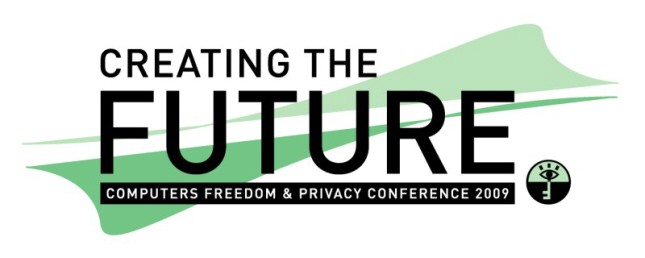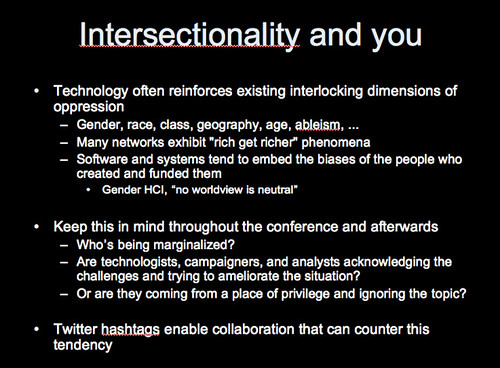Ask @bing to create grants for nonprofit advertising on their site (DRAFT)
Update, September 1: Microsoft responded. More here.
Draft! Work in progress! Feedback welcome!
embracing apparent contradictions, diversity and change
Update, September 1: Microsoft responded. More here.
Draft! Work in progress! Feedback welcome!
The notes from the “birds-of-a-feather” session I led at Computers, Freedom, and Privacy are written up on the CFP Wiki. Alas, we didn’t get the online aspects to work; still, we had a dozen people there in person, including Get FISA Right members Thomas Nephew and Chip Pitts. It was a great discussion. The opportunities we identified include
and a lot more. We also discussed some of the tactical issues about the upcoming PATRIOT Act vote: the need for an accurate vote count; a pressure campaign on key Congresspeople like Jane Harman, Nancy Pelosi, Dianne Feinstein, and Harry Reid; and the importance of powerful visual images.
jon
Comments Off on New strategies for fighting FISA and the PATRIOT Act

“Fight for me!”
— a privacy-loving Facebook friend, wishing me luck at the conference
Here’s our opportunity to realize the promise of the Net that was so present in 1990s when CFP started.
— Deborah Pierce on the CFP blog
The program for this year’s Computers, Freedom, and Privacy conference is outstanding even by CFP’s high standards. The mix of technology, legal, policy, and activism perspectives is particularly strong this year, and with the new administration and Washington DC location there’s significant involvement by government employees for the first time since the 1990s. As well as CFP regulars like Jennifer Grannick, Jim Harper, Ed Felten, Nicky Ozer, Alessandro Acquisti, Stewart Baker, and Lillie Coney, speakers incude first-timers like Marcy Wheeler, Dori Maynard, Paul Ekman, Shireen Mitchell, Rebecca Mackinnon, Nancy Scola, and Ari Melber. Don’t take my word for it — check out the program and prepare to be impressed.
Best of all, with streaming video, the #cfp09 Twitter backchannel ,* live-blogging, and a community wiki, the conference will be more accessible onine than every before.   Kudos to Katy Nelson of the ACLU and Robert Guerra of Freedom House for taking the lead with the video streaming, and to all the volunteers of the online visibility team for all the great work on the blog, Twitter, and Facebook. The online schedule has details, we’ll do our best to keep the web site updated regularly, and the Twitter feed will be best way to keep up what’s going on.
Along with Deborah Pierce, Shireen Mitchell, and Ari Melber, I’m presenting n the Twittering in the trenches workshop today at Computers, Freedom, and Privacy conference.
If all goes well, it’ll be streamed at http://www.ustream.tv/channel/cfp09 … and the Twitter hashtag is #cfp09.
Deborah’s post on the CFP blog has some background. Check it out!
I’ll be at CFP all week … stay tuned for more. For now, here’s the program.
Comments Off on Twittering in the Trenches: a workshop on social networks at #cfp09
7-8PM Pacific/10-11PM Eastern
Draft agenda and discussion here
Please join us!
Twitter is an opportunity to engage with communities currently marginalized by the “progressive blogosphere”
— Tracy Viselli and Jon Pincus, The #p2 Hashtag and Strategies for Progressives on Twitter on The Exception
#p2 is a resource for progressives who prioritize diversity and empowerment
— #p2’s wiki and Twitter profile
Because #p2 (aka “progressives 2.0”) is the closest thing to a broad communication mechanism for progressives on Twitter so far, I’m not sure how many people realize that the primary focus is on diversity. So here’s some background reading about #p2 for Thursday’s tweeting on how progressives can organize more effectively on Twitter.
Let’s start with a question that I think doesn’t get asked enough.
According to new data from the Bureau of Labor Statistics, in 2007 the ratio of women’s and men’s median annual earnings reached almost 78 cents on the dollar for full-time year-round workers, up from just under 77 cents in 2006. This is the narrowest the wage gap has ever been, but it’s only an additional one cent on the dollar. One cent is chump change. It isn’t real change.
— from AAUW’s Equal Pay Day, April 28
African-American women earn 62¢ and Latinas earn 53¢ for every dollar earned by white, non-Hispanic men. #fairpay #fem2 #p2
— @NWLC on Twitter
One of President Obama’s first actions in late January was signing the Lilly Ledbetter Fair Pay Act into law. That’s only a first step, though; the next battle in the fight against wage discrimination is the Paycheck Fairness Act. The PFA updates the 45-year-old Equal Pay Act in many important ways, and passed the House with strong bipartisan support, and is currently before the Senate as S.182.
The AAUW’s site has a bunch of ways you can help: call your Senators, wear red,* blog about it, share on Facebook and join their group and cause, and tweet about it using the #fairpay hashtag. It’s all important; do as much as you can. There are a couple of things I’d specifically like to highlight.
Let’s start with Twitter, where this is another great opportunity for hashtag-based diversity activism. Activity via #fairpay accomplishes several things. Most obviously, it raises awareness: whenever you tweet, all your followers are reminded of the wage gap. If some of the Twitterati start retweeting, or there’s enough activity that #fairpay winds up in the top 10 “trending” hashtags, a lot more people will see it. So tweet away! If you’re not sure what to say, the National Women’s Law Center has some tweeting points you can use as inspiration.
DRAFT! Work in progress. Feedback welcome!
Update, April 27: This thread sparked and tied in with substantial discussion elsewhere — see the bottom of the main post for additional links. I developed my thoughts in Cognitive evolution and revolution, which I presented at Politics Online; the blog post and comments also document a couple of successful examples of Twitter as a strategy for diversity in male-, white- and elitist-dominated environments. I wonder why it’s so hard for some people to accept that (1) I know what strategy is, (2) I’ve been treating Twitter as a strategy, and (3) it’s working?
Update, April 2017: This has held up pretty well! I fixed some typos and links
Too often, Twitter is the enemy of complex thought, not its friend — if you’re on Twitter yourself, look at your last few weeks’ posts and see what fraction of your potential mental capability they actually express. Probably not much: that’s not what the tool is good for.
— Colin Delany in Twitter is not a strategy on e.Politics and techPresident
Yeap – Twitter is NOT a Strategy | http://ow.ly/1vIN
— @IsCool, on Twitter
— Adriel Hampton on Twitter
Somebody’s missing what’s going on here and I don’t think it’s Adriel.

Opening slide from early draft of Hashtags at #polc09
Politics Online (1, 2) was a great conference, at least from my perspective. Starting with the opening session by Secretaries of State Debra Bowen and Jennifer Brunner, every session I went to had great content.  It was a wonderful opportunity to meet friends and colleagues in-person, many for the first time,* and to be on a panel with people like Judith Donath and Clive Thompson.  And of course was also a good chance to continue the Twitter *is* a strategy debate and explore progressives’ bizarre resistance to embrace social network activism; more on that soon.
First, though, I’d like to follow up on the experiment in cognitive evolution and revolution I kicked off in the opening panel.
Continue Reading »

Update, April 21: added some additional links here
Amazon’s stock has recovered, bouyed by Friday’s report that Kindle sales have exceeded expectations. Traffic on the #amazonfail hashtag is much lighter. The auction for AmazonFail.com is over, at least for the time being.
But I don’t think this issue’s going away quite that quickly.
Right now it feels like everybody’s taking a step back and reflecting. There’s general agreement on the narrative described in the National Coalition Against Censorship’s #amazonfail explained in a flowchart and there’s a theme starting to emerge in the tweets on #amazonfail and blog posts:
It’s not over.
 |
 |
The National Day of Silence brings attention to anti-LGBT name-calling, bullying and harassment in schools. Each year the event has grown, now with hundreds of thousands of students coming together to encourage schools and classmates to address the problem of anti-LGBT behavior.
11-year-old Carl Walker-Hoover took his own life last week after constant bullying, including daily taunts of being gay. yet another reminder of how important this issue is to kids and anybody who cares about them. This year, the National Day of Silence is Friday, April 17. Tweet the silence is a way for everybody to support the students standing up against anti-LGBT bullying … and to help create more awareness of the issue.
I’ve got a couple of new guest-blog posts up elsewhere:
Thanks to Jason Rosenbaum of The Seminal and Eve Enslow and Michael Foster of The Ideators’ Journey for the opportunities!

Clay’s post The failure of #amazonfail admits that over the weekend, he jumped to conclusions, “believed things that weren’t true” about Amazon and was “intoxicated” by the hashtag. He now thinks he was wrong. Most of the post is written in the first person plural, assuming everybody else reacted as he did. He concludes that “we” should apologize to Amazon. Here’s my reply, originally posted as a comment.
Update: aemeliaclare says it far better than me on Barely and Widely, as does Mike Edwards. Many of the commenters in Clay’s thread have good things to say as well. On Twitter, by contrast, the backlash is out in force, with many positive responses to “the great Shirky”.
Update on April 16: Janet D. Stemwedel’s Morality, outrage, and #amazonfail: a reply to Clay Shirky on Adventures in Ethics and Science, and Andrew Sempere’s Why Shirky Missed the Point on A repository of ten thousand indignities and the harbinger of God knew what are two more examples of “saying it better than me”. Nadia Cooke’s On the resolution of #amazonfail on The Ink Spectrum and Landon Bryce’s It’s Still On: The real failure of Amazonfail, Dubai, and Internet Outrage on Bookkake aren’t phrased as replies to Shirky, but make some very complementary points.
By contrast, Meg Pickard’s Spreading like wildfire: Twitter, Amazon and the social media mob focuses on what she sees as “ugly, prejudiced, underinformed, sneery, rude, kneejerk activity” on Twitter and sees it as “Destructive. Damaging. Virulent. Unapologetic. Unrelenting.” Sigh.
My replies to Clay and Meg below the fold.